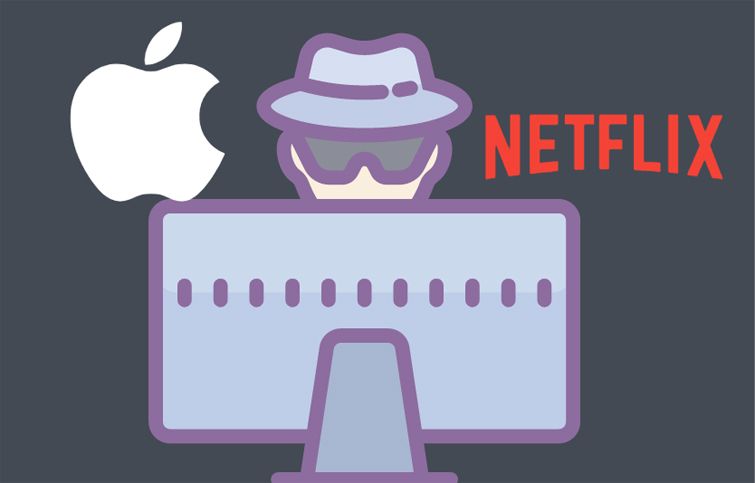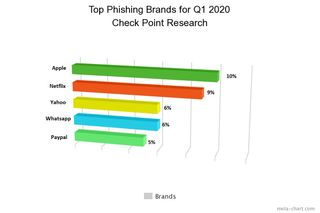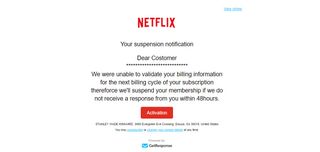Apple, Netflix among most imitated brands for 2020 phishing attacks
Cybercriminals love masquerading as Netflix and more

Cybercriminals are trying to win your trust by posing as big-name platforms, according to cybersecurity intelligence firm Check Point Research. Apple and Netflix are among the most imitated 2020 brands used by phishing attackers –– but they're not alone.
Check Point Research analyzed the brands that are the most frequently used to disguise cybercriminals' nefarious phishing attacks for Q1 of 2020 and, overall, Apple topped the list, followed by Netflix, Yahoo, WhatsApp and PayPal.
- Have you noticed a surge in phishing emails since the coronavirus outbreak? We have, too!
- Zoom, Google Hangouts attract phishing and malware hackers: how to protect yourself
- 500,000 Zoom passwords sold on the dark web: Check if you're compromised

Check Point Research also broke down the most popular brands for phishing attackers by platform, including web and email. The top four brands used by cybercriminals on the web are Apple, Netflix, Paypal and eBay. For email, the top four are Yahoo, Microsoft, Outlook and Amazon.
Web was the most used platform by phishing criminals (59%), followed by mobile (23%) and email (18%).
Funnily enough, Check Point Research's report hit my inbox shortly after I discovered a phishing attempt in my own email from a cybercriminal masquerading as Netflix. The hacker was so ravenous for money, he or she spelled "customer" as without "costumer," a telling Freudian slip.

In many phishing attacks, cybercriminals lure unwitting victims to websites that resemble the official facade of a well-known brands. Hackers attempt to create web pages that imitate the design and theme of the trusted brand, hoping to trick victims into believing that they've landed on a genuine site.
Unsuspecting victims end up plugging in their sensitive personal data into the fraudulent web page, including credit card information, home address, password and more.
Stay in the know with Laptop Mag
Get our in-depth reviews, helpful tips, great deals, and the biggest news stories delivered to your inbox.
Check Point Research explained that they've spotted a growing number of phishing attempts in the tech, media, and banking industry as the world grapples with working from home, potential changes to finances and an increased need for entertainment services.
As a result, hackers are capitalizing off the pandemic -- as we've reported before -- and flocking to platforms with skyrocketing demand due to the coronavirus outbreak.
“Phishing will continue to be a growing threat in the coming months, especially as criminals continue to exploit the fears and needs of people using essential services from their homes," said Maya Horowitz, Director of Threat Intelligence & Research at Check Point.
"As always, we encourage users to be vigilant and cautious when divulging personal data," Horowitz added.
Kimberly Gedeon, holding a Master's degree in International Journalism, launched her career as a journalist for MadameNoire's business beat in 2013. She loved translating stuffy stories about the economy, personal finance and investing into digestible, easy-to-understand, entertaining stories for young women of color. During her time on the business beat, she discovered her passion for tech as she dove into articles about tech entrepreneurship, the Consumer Electronics Show (CES) and the latest tablets. After eight years of freelancing, dabbling in a myriad of beats, she's finally found a home at Laptop Mag that accepts her as the crypto-addicted, virtual reality-loving, investing-focused, tech-fascinated nerd she is. Woot!
